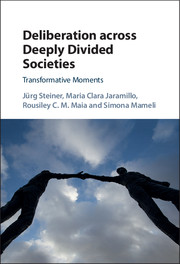Deliberation across Deeply Divided Societies
 Deliberation across Deeply Divided Societies
Deliberation across Deeply Divided Societies
Transformative Moments
Jürg Steiner, Maria Clara Jaramillo, Rousiley Maia, Simona Mameli
Cambridge University Press
mars 2017
267 p.
65 £
From the local level to international politics, deliberation helps to increase mutual understanding and trust, in order to arrive at political decisions of high epistemic value and legitimacy. This book gives deliberation a dynamic dimension, analysing how levels of deliberation rise and fall in group discussions, and introducing the concept of 'deliberative transformative moments' and how they can be applied to deeply divided societies, where deliberation is most needed but also most difficult to work. Discussions between ex-guerrillas and ex-paramilitaries in Colombia, Serbs and Bosnjaks in Bosnia-Herzegovina, and police officers and locals in Brazilian favelas are used as case studies, with participants addressing how peace can be attained in their countries. Allowing access to the records and transcripts of the discussions opens an opportunity for practitioners of conflict resolution to apply this research to their work in trouble spots of the world, creating a link between the theory and practice of deliberation.
The book adopts an interpretative qualitative approach, allowing readers to understand the material without analysing complex tables and statistics
Table of Contents
Introduction
1. The collection of the empirical data
2. Personal stories and deliberative transformative moments
3. Rationality and deliberative transformative moments
4. Humor, sarcasm and deliberative transformative moments
5. Muteness and deliberative transformative moments
6. Deliberative leaders
7. Deliberative spoilers
8. Outcomes and deliberative transformative moments
Conclusion.